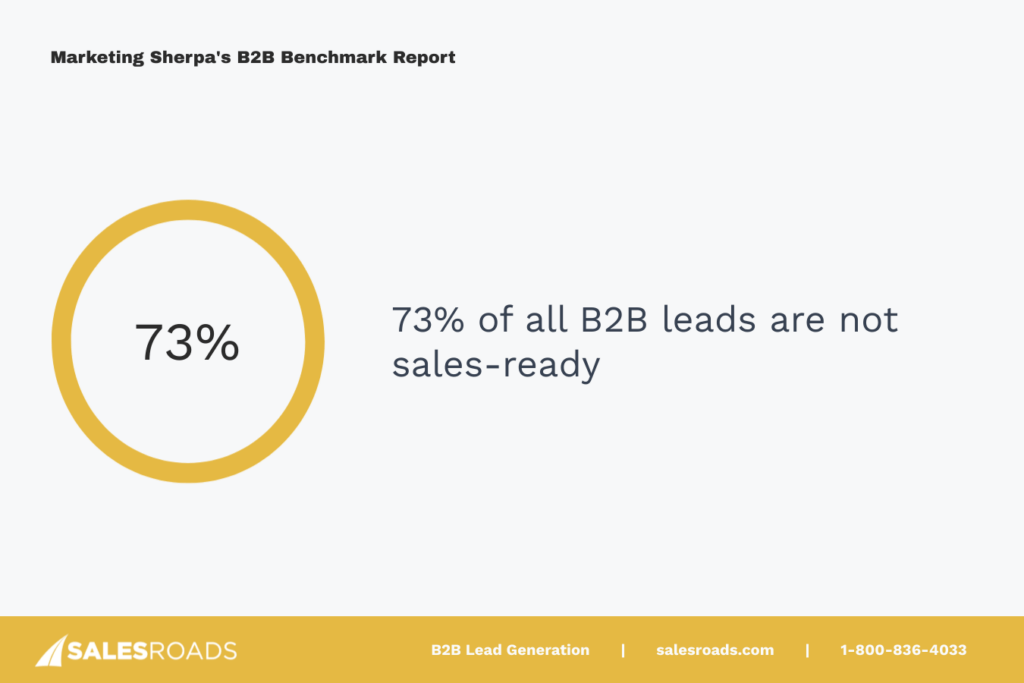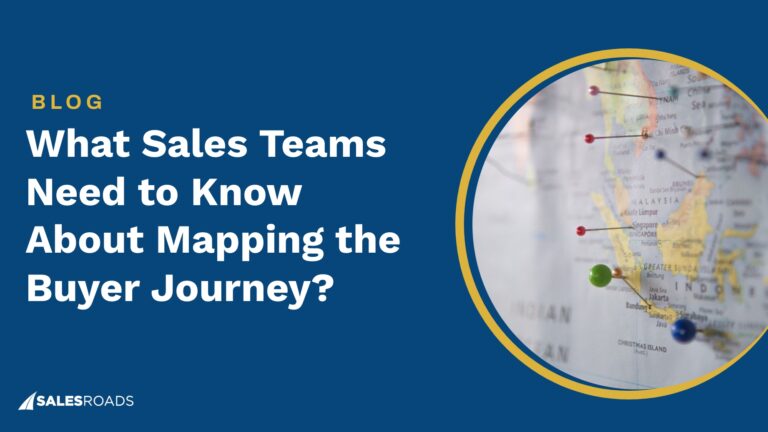Qualifying sales leads is the process of identifying and weeding out unqualified leads from potential customers who are a good fit for your product or service. It’s like filtering a contact list to separate promising prospects from those unlikely to convert into sales.
As we covered qualifying leads definition, let’s understand why it’s crucial to qualify leads and prospects.
Reasons Why Lead Qualification Is Crucial
Marketing Sherpa’s B2B Benchmark Report reveals that 73% of B2B leads require further nurturing before they are considered sales-ready.

Effective lead qualifying is the cornerstone of any successful sales operation. It’s the process of identifying promising leads and separating them from those who are unlikely to convert.
Here’s why lead qualification is crucial for your sales team:
Focuses Efforts on High-Quality Prospects
By implementing a lead qualification process, your sales reps can spend their valuable time nurturing qualified leads who are more likely to make a purchase decision. This eliminates wasted time and effort spent on unqualified leads, ultimately increasing conversion rates and maximizing sales efforts.
Improves Sales Pipeline Quality
Lead qualification acts as a filter, ensuring your sales pipeline is filled with sales-qualified leads (SQLs) who have a genuine need for your offering, the budget to afford it, and the decision-making authority to move forward. This translates to a more predictable sales process with a higher likelihood of closing deals and achieving business growth.
Boosts Sales Team Efficiency
Qualifying leads upfront allows your sales reps to tailor their conversations and presentations to the specific needs and challenges of each potential buyer. This personalized approach fosters trust and builds stronger relationships with prospects, leading to a more efficient sales process and improved customer experiences.
Enhances Customer Satisfaction
By focusing on qualified leads, you’re more likely to convert prospects into happy customers. These customers have a genuine need for your product or service, leading to higher satisfaction and a greater chance of repeat business and positive customer feedback.
What are the Challenges of Lead Qualification?
Even though lead qualification is crucial, it’s not without its hurdles. Here are some of the common challenges sales teams face in the lead-qualifying process:
- Defining the ideal customer profile (ICP): The foundation of effective lead qualification is a clear understanding of your ICP. An unclear ICP can lead to sales reps pursuing unqualified leads who don’t align with your product’s value proposition.
- Inconsistent qualification criteria: Without a standardized approach, lead qualification can become subjective and inconsistent. This can lead to situations where unqualified leads enter the sales funnel, wasting valuable time and resources.
- Distinguishing between buying stages: Not all leads are created equal. Some potential customers may be in the early research phase, while others are closer to making a purchase decision.
- Aligning sales and marketing efforts: For lead qualification to be truly effective, there needs to be strong collaboration between sales and marketing teams.
By overcoming these challenges and implementing a structured sales qualification process, your sales team can focus on high-quality prospects, ultimately leading to successful sales and business growth.
How Does It Work? Lead Qualification Methods
So, we’ve established the importance of qualifying sales leads (identifying promising prospects). Now, let’s delve into the practical aspects: how to qualify leads and prospects.
There are various methods you can leverage to implement an effective sales qualification process. Here are some key approaches:
Defining Your ICP
The foundation of successful lead qualification is a clear picture of your ideal customer profile. This detailed profile outlines the characteristics of your perfect customer, including factors like:
- Company size and industry
- Budget and decision-making authority
- Pain points and challenges
- Buying stages and decision-making process
By having a well-defined ICP, your sales representatives can effectively assess incoming leads and prioritize those that closely resemble your ideal customer.
Utilizing Lead Scoring Models
Lead scoring assigns points to leads based on their demographics, firmographics (company data), and online behavior. This numerical score helps rank leads and identify the most promising prospects for your sales team to pursue.
Lead scoring can be a valuable tool, but it should always be used in conjunction with qualifying questions that delve deeper into a prospect’s specific needs and purchase decision timeline.
Leveraging Sales Qualification Frameworks
Structured qualification frameworks provide a standardized approach to evaluating leads. Popular frameworks like BANT (Budget, Authority, Need, Timeline) or CHAMP (Challenges, Authority, Money, Priority) offer a checklist of criteria to assess a lead’s fit for your product or service. These frameworks ensure consistency and prevent unqualified leads from slipping through the cracks of your sales funnel.
Qualifying Questions Definition and the Power of Qualifying Questions
Qualifying questions are open-ended inquiries designed to uncover a prospect’s specific needs, challenges, and decision-making process. By asking the right questions, sales representatives can gain valuable insights into a prospect’s buying stage and determine if they are a good fit for what you offer.
Examples of qualifying questions include:
- “What are your biggest challenges related to [your product/service area]?”
- “What is your budget for a solution like ours?”
- “Who is ultimately responsible for making the purchase decision?”
Effective use of qualifying questions allows your sales team to prioritize leads and tailor their approach for maximum impact.
By implementing these methods and sales qualification processes, you can transform your lead pool from a sea of generic inquiries into a targeted group of high-quality prospects most likely to convert into successful sales and happy customers.
Tools for Lead Qualification
Today, sales teams have access to a wealth of lead qualification tools to streamline the process and maximize sales efforts. Let’s explore some key options:
Customer Relationship Management (CRM) Systems
CRM systems are a cornerstone of any sales organization. These platforms allow you to capture and store valuable lead data, including contact information, company size, and industry. This data can be used to qualify leads against your ICP and ensure you’re targeting the right audience.
Sales qualification frameworks can also be integrated into your CRM, providing a structured approach to evaluating leads within the system.
Social Selling Tools
Social selling tools allow sales reps to connect with potential customers on social media platforms like LinkedIn. By following industry leaders and engaging in relevant conversations, sales reps can identify promising prospects who might not have filled out a traditional lead form.
Social listening features within these tools can also be used to qualify leads based on their online activity and buying stages. Are they sharing articles about common pain points your product solves? This could be a strong indicator of their interest and readiness to engage with you.
Website Lead Capture Forms
Website lead capture forms are a vital tool for generating leads. However, not all form submissions are created equal. By including qualifying questions within your forms, you can gather valuable information upfront and qualify leads based on their specific needs and budget. This ensures your sales reps are only spending time with high-quality prospects most likely to convert.
By leveraging these lead qualification tools, your sales team can qualify leads more efficiently, shorten your sales cycle, and ultimately drive business growth through successful sales and happy customers.
Bottom Line
While generating leads is crucial, it’s the quality, not just the quantity, that fuels sales success. Qualifying sales leads is an investment that yields significant returns. By implementing a structured sales qualification process, you can transform your lead pool into a targeted group of high-quality prospects most likely to convert into successful sales and, ultimately, happy customers.










